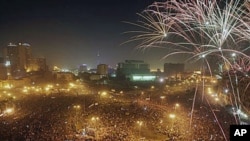Analysts question whether a new Egyptian government replacing ousted President Hosni Mubarak would change Cairo’s position of not seeking nuclear weapons.
Egypt has two nuclear research reactors located near Cairo. They are used for peaceful purposes and are under International Atomic Energy Agency - or IAEA - safeguards.
Analysts agree that Egypt tried to acquire nuclear weapons back in the 1960s, but ultimately decided not to do so because of political and economic reasons. In February, 1981, Egypt ratified the Nuclear Non Proliferation Treaty - or NPT - the legal cornerstone of non-proliferation efforts.
Open options
Mark Fitzpatrick, from London’s International Institute for Strategic Studies, said Egypt is not trying to become a nuclear weapons state.
“The most one could say is that Egypt may be desiring to keep its options open. And among the Egyptian body politic, there is a point of view expressed by several parties that Egypt should pursue nuclear weapons.”
Fitzpatrick said some opposition parties have expressed that view as recently as December 2009 in a debate in parliament.
And what about the position of the Muslim Brotherhood - Egypt’s oldest and largest Islamist organization?
Henry Sokolski, Director of the Nonproliferation Policy Education Center, said the Brotherhood’s view is unclear.
Uncertain intentions
“Right now they are saying oh, we’re not interested in them. Not more than two or three years ago, many of their key spokesmen said it was absolutely critical to the Egyptian government to get them. My guess is that their perspective is tactical, to pleasing what might be the western audience, and therefore we have to take seriously their earlier claims and those claims may be the ones that they will revert to at some later point,” said Sokolski.
Some experts have questioned whether a government replacing President Hosni Mubarak might push for a change in Egyptian policy, urging Cairo to build nuclear weapons.
But former Defense Department official James Russell, now with the Naval Postgraduate School in Monterey, [CA], said there is one overwhelming reason why Egypt will not opt for nuclear weapons.
Financial constraints
“The fact of the matter is, is that Egypt still lacks the money, which is significant, for construction of even a peaceful nuclear power plant that would be under IAEA oversight," said Russell. "[Nuclear power] plants cost anywhere between $1.5 billion and $2 billion. And this is not money that the Egyptians have.”
Russell said another reason is the example of Iran - and more specifically, the international sanctions imposed on Tehran for its alleged nuclear weapons program.
“Everyone wants to sort of pooh-pooh [dismiss] the costs that are being posed on the Iranians for this activity that they are engaged in. But the costs are significant. If you just look, for example, at foreign direct investments, it’s all but dried up. The investments that Iran, for example, needs in its upstream gas and oil sector development are just not there. So they are paying significant prices for this illicit activity.”
Nuclear weapons-free zone
Another factor against Egypt acquiring nuclear weapons is that Cairo has been the strongest proponent of a nuclear weapons-free zone in the Middle East.
Fitzpatrick said there must be some movement in that direction.
“Some in Egypt say that if there is no progress on a nuclear weapons-free zone, that it would give those who want a nuclear weapon added ammunition for that position. I think there’s a certain sense in Egypt that their desire for a nuclear weapons-free region has been frustrated and if they can’t get it, maybe they should go a different route. That’s not the mainstream sentiment in Egypt, but one can sense that growing frustration,” said Fitzpatrick.
Analysts say the next test will come next year when an international conference will be devoted to the issue of a nuclear weapons free zone in the Middle East.




